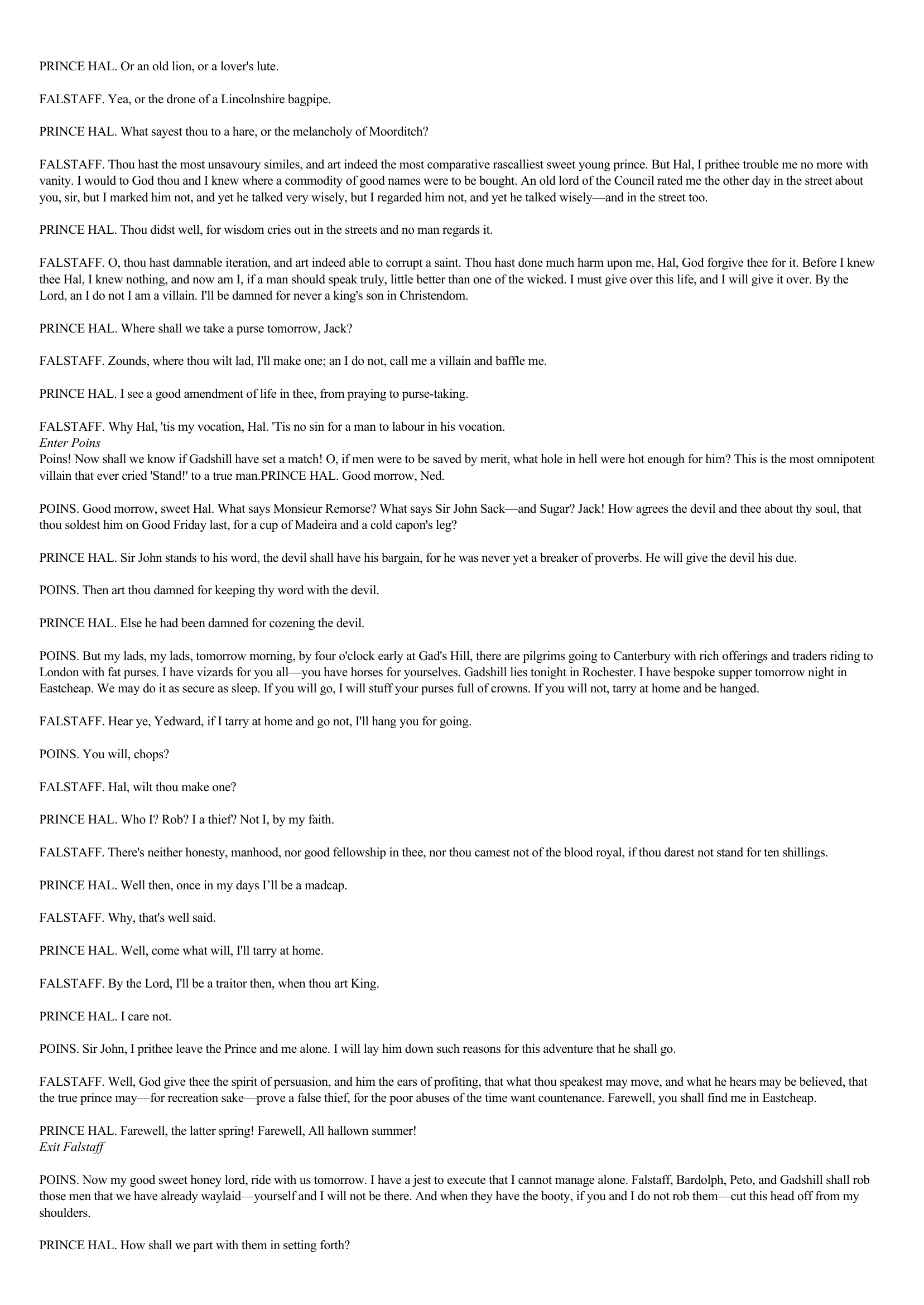Excerpt from Henry IV - anthology.
Publié le 12/05/2013

Extrait du document
«
PRINCE HAL.
Or an old lion, or a lover's lute.
FALSTAFF.
Yea, or the drone of a Lincolnshire bagpipe.
PRINCE HAL.
What sayest thou to a hare, or the melancholy of Moorditch?
FALSTAFF.
Thou hast the most unsavoury similes, and art indeed the most comparative rascalliest sweet young prince.
But Hal, I prithee trouble me no more withvanity.
I would to God thou and I knew where a commodity of good names were to be bought.
An old lord of the Council rated me the other day in the street aboutyou, sir, but I marked him not, and yet he talked very wisely, but I regarded him not, and yet he talked wisely—and in the street too.
PRINCE HAL.
Thou didst well, for wisdom cries out in the streets and no man regards it.
FALSTAFF.
O, thou hast damnable iteration, and art indeed able to corrupt a saint.
Thou hast done much harm upon me, Hal, God forgive thee for it.
Before I knewthee Hal, I knew nothing, and now am I, if a man should speak truly, little better than one of the wicked.
I must give over this life, and I will give it over.
By theLord, an I do not I am a villain.
I'll be damned for never a king's son in Christendom.
PRINCE HAL.
Where shall we take a purse tomorrow, Jack?
FALSTAFF.
Zounds, where thou wilt lad, I'll make one; an I do not, call me a villain and baffle me.
PRINCE HAL.
I see a good amendment of life in thee, from praying to purse-taking.
FALSTAFF.
Why Hal, 'tis my vocation, Hal.
'Tis no sin for a man to labour in his vocation.Enter PoinsPoins! Now shall we know if Gadshill have set a match! O, if men were to be saved by merit, what hole in hell were hot enough for him? This is the most omnipotentvillain that ever cried 'Stand!' to a true man.PRINCE HAL.
Good morrow, Ned.
POINS.
Good morrow, sweet Hal.
What says Monsieur Remorse? What says Sir John Sack—and Sugar? Jack! How agrees the devil and thee about thy soul, thatthou soldest him on Good Friday last, for a cup of Madeira and a cold capon's leg?
PRINCE HAL.
Sir John stands to his word, the devil shall have his bargain, for he was never yet a breaker of proverbs.
He will give the devil his due.
POINS.
Then art thou damned for keeping thy word with the devil.
PRINCE HAL.
Else he had been damned for cozening the devil.
POINS.
But my lads, my lads, tomorrow morning, by four o'clock early at Gad's Hill, there are pilgrims going to Canterbury with rich offerings and traders riding toLondon with fat purses.
I have vizards for you all—you have horses for yourselves.
Gadshill lies tonight in Rochester.
I have bespoke supper tomorrow night inEastcheap.
We may do it as secure as sleep.
If you will go, I will stuff your purses full of crowns.
If you will not, tarry at home and be hanged.
FALSTAFF.
Hear ye, Yedward, if I tarry at home and go not, I'll hang you for going.
POINS.
You will, chops?
FALSTAFF.
Hal, wilt thou make one?
PRINCE HAL.
Who I? Rob? I a thief? Not I, by my faith.
FALSTAFF.
There's neither honesty, manhood, nor good fellowship in thee, nor thou camest not of the blood royal, if thou darest not stand for ten shillings.
PRINCE HAL.
Well then, once in my days I’ll be a madcap.
FALSTAFF.
Why, that's well said.
PRINCE HAL.
Well, come what will, I'll tarry at home.
FALSTAFF.
By the Lord, I'll be a traitor then, when thou art King.
PRINCE HAL.
I care not.
POINS.
Sir John, I prithee leave the Prince and me alone.
I will lay him down such reasons for this adventure that he shall go.
FALSTAFF.
Well, God give thee the spirit of persuasion, and him the ears of profiting, that what thou speakest may move, and what he hears may be believed, thatthe true prince may—for recreation sake—prove a false thief, for the poor abuses of the time want countenance.
Farewell, you shall find me in Eastcheap.
PRINCE HAL.
Farewell, the latter spring! Farewell, All hallown summer!Exit Falstaff
POINS.
Now my good sweet honey lord, ride with us tomorrow.
I have a jest to execute that I cannot manage alone.
Falstaff, Bardolph, Peto, and Gadshill shall robthose men that we have already waylaid—yourself and I will not be there.
And when they have the booty, if you and I do not rob them—cut this head off from myshoulders.
PRINCE HAL.
How shall we part with them in setting forth?.
»
↓↓↓ APERÇU DU DOCUMENT ↓↓↓
Liens utiles
- Excerpt from Henry VI - anthology.
- Excerpt from Twelfth Night - anthology.
- Excerpt from Troilus and Cressida - anthology.
- Excerpt from Titus Andronicus - anthology.
- Excerpt from Timon of Athens - anthology.




